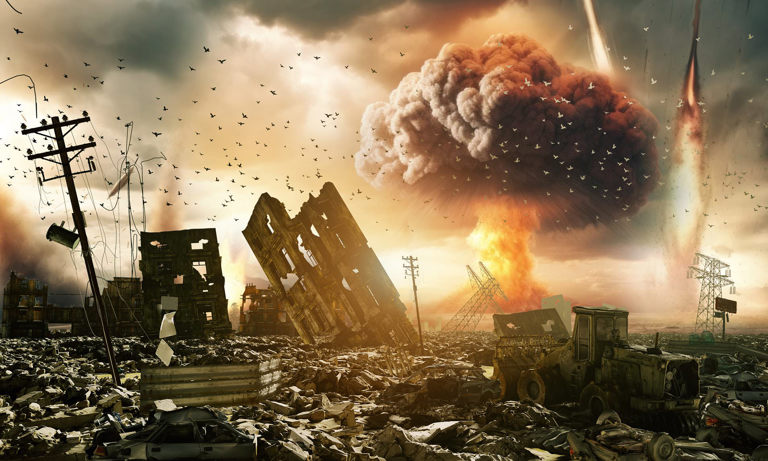By Ruth Anderson, Year 11
Have you found yourself staring at your screen gawking, gobsmacked and a little terrified at the, for lack of a better word, shit show that is now the political state of the world? Yeah, me too. Are you worried about World War III starting because some tanned skinned man who wears corn husk for hair and writes love letters to dictators is about to run one of the most influential countries in the world? Don’t worry, we’ve all been there. Unless we haven’t and you are one of the people who supports the tanned skinned man. In which case, you may believe that there is no chance of a World War because he is such a peacekeeper (and may I remind you a convicted felon). Nevertheless, the aim of my article is not to convince you to not support him, as it is already too late, but to reassure all the people who cannot help but worry about the probability of a third World War.
The discussion of a third World War is rapidly rising alongside geopolitical tensions. If you’ve been up to date on politics, you will know about the ongoing conflicts taking place throughout the globe: The Russia – Ukraine War, the trafficking in Congo, and the list goes on. Unfortunately, it is not in our power to stop these serious conflicts, meaning that these existing disputes combined with inconsiderate political policies could be a leeway for a new World War.
“Haven’t we learned from past World Wars?” you may be asking. I’ve been wondering the same. However, the main causes of these wars are still prevalent today. If you’re anything like me, you will have learned in year 10 that the MAIN causes of wars are Militarism, Alliances, Imperialism and Nationalism. Now, this is definitely not the exact criterion for every war that has ever happened and is going to happen, but it is the easiest way to measure whether there is a potential risk of such conflict.
The first cause, Militarism, is at a high. We have seen drastic and revolutionary advances in the military over the past 70 years since our last world war. The improvement of nuclear weapons, and defence systems: such as the U.S. THAAD, has already prepared many countries for the possibility of a war. In addition, the technological revolution has created easy access to advanced machinery such as drones and other unmanned machines alongside artificial intelligence. There’s even been cyber warfare, with the US having its own cyber unit named the US Cyber Command. However, the exact definition of militarism is “the belief that a country should maintain a strong military capability and be prepared to use it aggressively to defend or promote national interests”. So, a more accurate representation of modern militarism would be North Korea who have a strongly built army and army parades which they invest a large amount of their money in. This common desire for a strong military often leads to rivalries between countries, as they compete see who is the most powerful, and to ensure that, if the countries do enter a war, they can win.
Nationalism, although not next in the acronym, is the second most prevailing cause today. Populism is a political approach that stems from nationalism and was most rampant during Trump’s 2016 presidency. It can be defined as ‘a political approach that strives to appeal to ordinary people who feel that their concerns are disregarded by established elite groups’. Sadly, with Trump back in power now, it will most likely come into play again. His policies to restrict immigration and to withdraw from international agreements are great examples of this populist agenda. He has created plans to get rid of all immigrants in the US and of course, build a wall all in the name of “Making America Great Again”. This is incredibly problematic as it is going to isolate countries and get rid of international alliances.
The other two causes are less pervasive today. Alliances that are formed today are Global and usually established to ensure peace rather than war. Some examples of such alliances include : The UN, NATO and the EU. These alliances and others work to help resolve disagreements and maintain peace, though their effectiveness is questionable, with great criticism concerning their attempts to help the current global conflicts. There is also word of Trump’s America deciding to leave NATO which, although is likely probable, is a long difficult process that is not an impending threat.
The last cause, Imperialism, is also not widespread as it was before. The more orthodox form of imperialism, colonialism, has disappeared for the most part with the decolonization movement in the 20th century, allowing numerous countries to gain formal independence. However, a new form of imperialism has recently emerged: Neo-colonialism. This is when effects of colonization are dominant but there’s no explicit colonization happening. For example, African countries economies remain reliant on exporting raw materials like minerals and agricultural products to wealthier nations, continuing a pattern established during colonial rule.
Not only is there Neo-colonization but there is also geopolitical imperialism. This is where countries such as the US, China and Russia have large influences on the rest of the countries through economic trades, alliances and strong military. The political state of one of these countries can easily affect many others. Yet, despite all of these arguments, in reality the potential for World War III is actually quite small. I know I know, I’ve just spent the last 1035 words talking about how we are completely doomed, but the likelihood of a third World War is surprisingly low. Not zero but definitely lower than you’d expect. Why? Because we have changed in many ways since 1945. Firstly, we have social media. We have seen in recent events, people using social media as a platform to discuss political problems and raise awareness on these important issues. As someone who uses social media, including TikTok and Instagram, I see videos and posts on a daily basis from people in Congo, Sudan, Afghanistan etc. asking for support from the public. Help, which they usually get. Additionally, I see people from England, France, America, countries that are not in immediate danger, advocating for the people who are. In this way, social media can be used as an effective barrier against a potential war.
Another reason we won’t be going to war is due to the resource pressure that numerous countries in the world are facing. With the rapid increase in population, the demand for resources has increased but the production of these resources hasn’t. If there were to be a war, most resources would be used to fund it instead of being available for the people or industries. This leads me to my argument of Global interdependence, specifically economic interdependence. Countries that trade heavily with one another are economically dependent on each other. If there was a war or conflict, it would disrupt trade, causing economic losses for all countries involved. For example, The EU’s economic interdependence has been a major factor in maintaining peace among its members as the countries are reliant on each other for exports and imports. To further support this point, politicians and governments’ main objective is to look after their citizens, which is why they would aim to avoid a war, especially having seen the negative, long-lasting impacts.
It’s important for us to keep our heads up and do our best to keep informed on these matters so that if the chances of a World War increase, we are prepared. Being anxious about such phenomena is completely normal but for now, we should worry about wars that are actually happening rather than those that might happen in the future. If you’re worried about another World War, don’t be.



